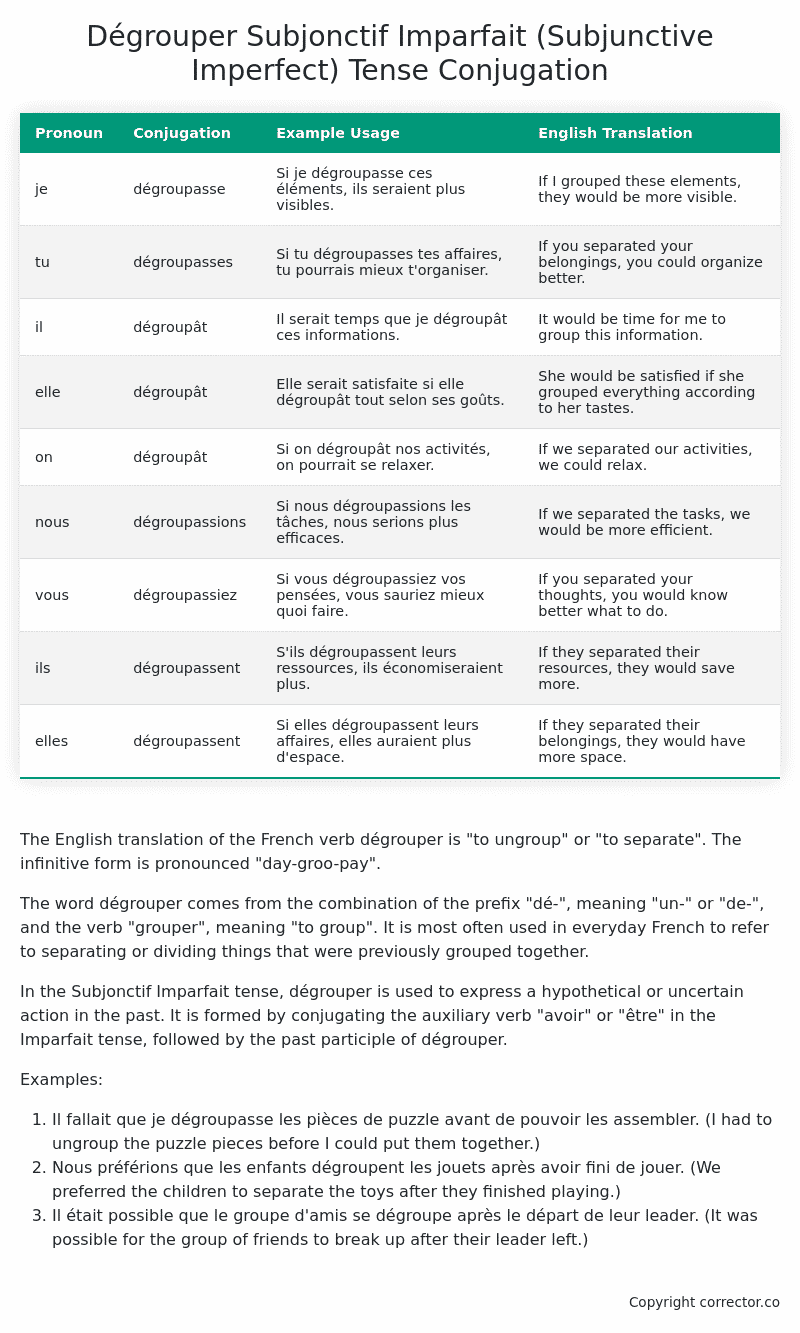Subjonctif Imparfait (Subjunctive Imperfect) Tense Conjugation of the French Verb dégrouper
Introduction to the verb dégrouper
The English translation of the French verb dégrouper is “to ungroup” or “to separate”. The infinitive form is pronounced “day-groo-pay”.
The word dégrouper comes from the combination of the prefix “dé-“, meaning “un-” or “de-“, and the verb “grouper”, meaning “to group”. It is most often used in everyday French to refer to separating or dividing things that were previously grouped together.
In the Subjonctif Imparfait tense, dégrouper is used to express a hypothetical or uncertain action in the past. It is formed by conjugating the auxiliary verb “avoir” or “être” in the Imparfait tense, followed by the past participle of dégrouper.
Examples:
- Il fallait que je dégroupasse les pièces de puzzle avant de pouvoir les assembler. (I had to ungroup the puzzle pieces before I could put them together.)
- Nous préférions que les enfants dégroupent les jouets après avoir fini de jouer. (We preferred the children to separate the toys after they finished playing.)
- Il était possible que le groupe d’amis se dégroupe après le départ de leur leader. (It was possible for the group of friends to break up after their leader left.)
Table of the Subjonctif Imparfait (Subjunctive Imperfect) Tense Conjugation of dégrouper
| Pronoun | Conjugation | Example Usage | English Translation |
|---|---|---|---|
| je | dégroupasse | Si je dégroupasse ces éléments, ils seraient plus visibles. | If I grouped these elements, they would be more visible. |
| tu | dégroupasses | Si tu dégroupasses tes affaires, tu pourrais mieux t’organiser. | If you separated your belongings, you could organize better. |
| il | dégroupât | Il serait temps que je dégroupât ces informations. | It would be time for me to group this information. |
| elle | dégroupât | Elle serait satisfaite si elle dégroupât tout selon ses goûts. | She would be satisfied if she grouped everything according to her tastes. |
| on | dégroupât | Si on dégroupât nos activités, on pourrait se relaxer. | If we separated our activities, we could relax. |
| nous | dégroupassions | Si nous dégroupassions les tâches, nous serions plus efficaces. | If we separated the tasks, we would be more efficient. |
| vous | dégroupassiez | Si vous dégroupassiez vos pensées, vous sauriez mieux quoi faire. | If you separated your thoughts, you would know better what to do. |
| ils | dégroupassent | S’ils dégroupassent leurs ressources, ils économiseraient plus. | If they separated their resources, they would save more. |
| elles | dégroupassent | Si elles dégroupassent leurs affaires, elles auraient plus d’espace. | If they separated their belongings, they would have more space. |
Other Conjugations for Dégrouper.
Le Present (Present Tense) Conjugation of the French Verb dégrouper
Imparfait (Imperfect) Tense Conjugation of the French Verb dégrouper
Passé Simple (Simple Past) Tense Conjugation of the French Verb dégrouper
Passé Composé (Present Perfect) Tense Conjugation of the French Verb dégrouper
Futur Simple (Simple Future) Tense Conjugation of the French Verb dégrouper
Futur Proche (Near Future) Tense Conjugation of the French Verb dégrouper
Plus-que-parfait (Pluperfect) Tense Conjugation of the French Verb dégrouper
Passé Antérieur (Past Anterior) Tense Conjugation of the French Verb dégrouper
Futur Antérieur (Future Anterior) Tense Conjugation of the French Verb dégrouper
Subjonctif Présent (Subjunctive Present) Tense Conjugation of the French Verb dégrouper
Subjonctif Passé (Subjunctive Past) Tense Conjugation of the French Verb dégrouper
Subjonctif Imparfait (Subjunctive Imperfect) Tense Conjugation of the French Verb dégrouper (this article)
Subjonctif Plus-que-parfait (Subjunctive Pluperfect) Tense Conjugation of the French Verb dégrouper
Conditionnel Présent (Conditional Present) Tense Conjugation of the French Verb dégrouper
Conditionnel Passé (Conditional Past) Tense Conjugation of the French Verb dégrouper
L’impératif Présent (Imperative Present) Tense Conjugation of the French Verb dégrouper
L’infinitif Présent (Infinitive Present) Tense Conjugation of the French Verb dégrouper
Struggling with French verbs or the language in general? Why not use our free French Grammar Checker – no registration required!
Get a FREE Download Study Sheet of this Conjugation 🔥
Simply right click the image below, click “save image” and get your free reference for the dégrouper Subjonctif Imparfait tense conjugation!

Dégrouper – About the French Subjonctif Imparfait (Subjunctive Imperfect) Tense
Formation
Common Everyday Usage Patterns
Interactions with Other Tenses
Subjonctif Présent
Indicatif Passé Composé
Conditional
Conditional Perfect
Summary
I hope you enjoyed this article on the verb dégrouper. Still in a learning mood? Check out another TOTALLY random French verb conjugation!


